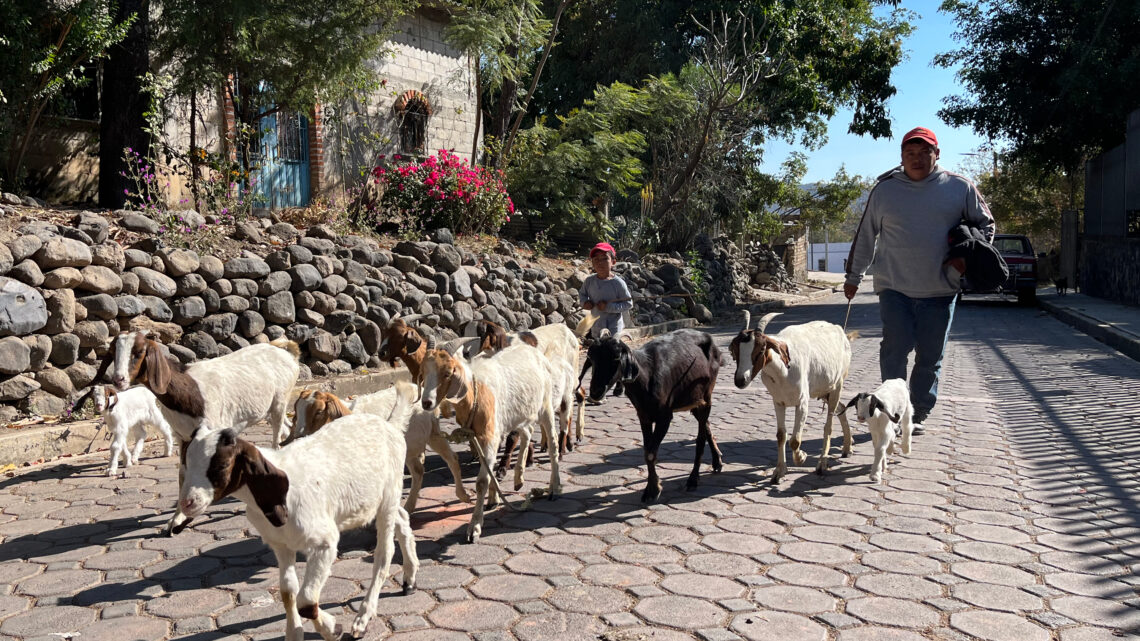
Mountain of Money From New York Migrants Sustains Mexican Towns Through Pandemic
January 31, 2022Isabet Lino Cardoso hasn’t lived in New York City since 2007 but, like many natives of this southern Mexican state, he remains connected.
Two of his children, based in Queens and New Jersey, often transfer money to him and their family in Puebla, helping to keep them afloat during the worst of the pandemic.
“I am proud of my son and my daughter who sent us extra money, because if it weren’t for them, if it weren’t for all the Mexicans who are in New York, Mexico would be in disgrace,” said Lino Cardoso, 60, who lives in Cacaloxúchitl, a rural village where he earns the equivalent of $5 to $10 a day as a farmer of corn and livestock.
He smiled modestly as he pulled a crinkled remittance receipt from his wallet, revealing a recent $200 transfer from his 38-year-old son who lives in Flushing.
“In fact, he is even sending tomorrow,” Lino Cardoso said earlier this month.
Remittances to Mexico are shattering records, defying economic analysts’ initial predictions that the pandemic would stifle the flow of funds to the United States’ southern neighbor — where nearly half of the population lives below the poverty line.
Mexico’s central bank estimates the country received $51 billion in remittances in 2021, up from $40 billion in 2020. Pre-pandemic, in 2019, Mexico reported $36 billion.
The average remittance rose to $378 in 2021 through November, according to data from the Bank of Mexico, up from $340 over the same period in 2020. The number of transfers also increased, to 123 million, up from 108 million.
The majority of money — sent via apps like Xoom and Remitly or transfer companies like Western Union and MoneyGram — comes from Mexicans in the U.S. While the largest populations reside in California, Texas and Illinois, more than 300,000 Mexicans live in New York City, according to the latest census figures.
“We’re seeing more people remitting money than before, and they’ve been sending back more than they’re used to,” said Andrew Selee, president of the Migration Policy Institute, a Washington D.C.-based think tank dedicated to improving immigration policies. “And it’s really a solidarity response to family members that are in trouble during the COVID crisis.”
Most Mexicans in New York City originate from the state of Puebla, followed by Oaxaca and Guerrero — the three states comprising the Mixteca region — according to the Consulate General of Mexico in New York.
These states saw a remittance uptick from January through September 2021 over the same period in 2020. Residents of Puebla collected $1.5 billion, up $200 million. Oaxaca collected $1.7 billion, up $300 million, while Guerrero collected $1.8 billion, up $400 million.
President Andrés Manuel López Obrador has praised Mexicans abroad for financially sustaining their families during the pandemic, branding them “heroes.” Speaking at a press conference earlier this month, he cheered on the record-breaking remittances.
“This got us out of the hole,” López Obrador said, deploying a baseball metaphor.
Selee noted, however, it’s not all good news. “It’s mostly good for people, you know, as people solving their own problems and getting ahead. But systemically, I mean, it does take the government off the hook sometimes for solving problems,” he said.
‘Willing to Go Hungry’
To transfer money, many Mexican New Yorkers make enormous sacrifices, said Jairo Gúzman, president of Coalición Mexicana, a social-service nonprofit in The Bronx.
“They’re willing to go hungry,” Gúzman said. “They’re willing to not have luxuries.”
He added that cold-weather wear is among those “luxuries,” noting that his nonprofit recently distributed almost 500 jackets, mostly to men who weren’t prepared for winter.
“This is one of the things that they were not going to be able to buy because they needed to send money back home,” he said. “That’s the sacrifice they have to make.”
It’s not uncommon for four or more immigrants to share a basement or single-bedroom apartment, taking turns sleeping on one bed, he said. The risk of illness — or, worse, death or deportation — factors into their calculation to send greater amounts of money.
“There’s this fatalistic thing where folks are saying, ‘I can give now, so I’m going to give the max because I don’t know if I’m going to be able to do it tomorrow,’” Gúzman said.
Many Mexican immigrants endured job loss or a reduction of hours in New York because of the pandemic, yet they knew they could overcome obstacles to support themselves and their relatives on the brink of sliding into extreme poverty in their native country, Selee said.
Before the pandemic, in 2019 and 2020, Mexico was already in a recession. It was the country’s worst economic performance since 1932, said Jose Ivan Rodriquez-Sanchez of the Center for the United States and Mexico at Rice University’s Baker Institute.
“Of course, it was accelerated with a pandemic,” Rodriquez-Sanchez said. He noted millions of people lost jobs, “hundreds of thousands” of businesses fell into bankruptcy and legions of workers took informal jobs earning low wages and not paying taxes.
As of Jan. 30, more than 305,000 people have died in Mexico due to COVID-19, according to data analyzed by Johns Hopkins University.
In 2020 and 2021, Americans benefited from three rounds of stimulus checks. But Mexicans didn’t receive any such support.
“The Mexican government decided not to pump money into the economy during the pandemic,” said Duncan Wood of the Washington D.C.-based Wilson Center’s Mexico Institute. “They preferred fiscal conservatism instead.”
That resulted in severe hardship for many citizens of the country, where more than half of workers are employed in the informal sector, already not recipients of the federal minimum wage, benefits and protections. In small municipalities where relatives of many New Yorkers live, “we saw a reversion to the family economy,” he added.
“This is what helps to explain the increased demand for remittances… People turned to their family networks for support because, literally, there was nobody else to turn to,” Wood said. “The government wasn’t doing anything to help them.”
‘We Would Not Have Been Able to Survive’
At the beginning of the pandemic, Lino Cardoso said his family worried how they would survive, if not for the money his children sent. (His son declined to speak with THE CITY.)
“We still didn’t work here,” he said. “There still was nothing.”
He finally resumed working as a campesino in mid-October 2020, he said.
Despite pandemic-related disruptions to the economy in New York City and throughout the U.S., many Mexican immigrants found jobs as day laborers, construction workers, restaurant cooks, janitors and deliveristas. They received praise as “essential workers.”
“It’s not that people didn’t have a hard time, but in a developed economy, there just were more opportunities for people,” Selee said.
Many Mexican Americans also received stimulus checks. And some undocumented immigrants qualified for aid through New York’s $2.1 billion Excluded Worker Fund, intended to help those cut off from other government assistance programs.
The abundance of opportunities in the United States is widely known in Puebla because everybody has at least one relative in the States who sends money home, said Raúl Marín, mayor of Huaquechula, who has about 40 relatives in New York and New Jersey.
“I am also an immigrant,” Marín told THE CITY. “I was there for three years, and we know that the roots we have must not be forgotten.”
Gustavo Sánchez Martiñón, former mayor of Tepeojuma, another small municipality nearby, said the pandemic exacerbated already dire conditions in his country, prompting Mexican migrants to sacrifice even more for their families in need.
“Many jobs were lost precisely due to COVID-19 and without the support in the United States of those families, we would not have been able to survive,” said Sánchez Martiñón, whose brother lives in Brooklyn and sends money to their parents.
Sánchez Martiñón said another sacrifice immigrants make is leaving family behind, noting that it’s common for families to be separated for 15 years or more.
He said the “father returns to Mexico when he is no longer useful in the United States, when he is old, tired, when he is no longer useful in the labor workforce.”
He said heading north to the U.S. for work is itself an act of love.
“They are people who love their family very much, to the point that if they did not love them, they would not have gone to the United States,” he said.
Surviving on Food Pantries
On Thursday in the Sunset Park neighborhood of Brooklyn, a line of New Yorkers shivered as they waited for a food pantry to open at Mixteca, a nonprofit focused on the empowerment of Mexican and Latin American immigrants.
A 53-year-old woman, originally from the town of San Jerónimo Coyula in Puebla, stood patiently at the front of the line along with her 10-year-old son. She said she comes to the food pantry often to pick up tortillas, beans, rice, tomatoes and other vegetables.
She said without the extra help — especially early in the pandemic when she couldn’t find work cleaning homes — she would have struggled to feed her family, as well as pay rent on the apartment she shares with her son, husband and two other adults.
“There was no food,” the woman, who preferred not to be named, said of the early days of the pandemic. “There was no security. Everything was closed. There was no work.”
She still struggles to find work cleaning homes but manages to send $120 per month to her younger sister who lives in Puebla with a son and daughter. She said her brother, who lives in Florida, also sends money to their sister, who sells tortillas for a living.
Lorena Kourousias, executive director of Mixteca, said the undocumented community carries a lot of shame due their immigration status, but Mexicans succeed by becoming “invisible” to authorities and those who intend to do them harm.
“They really try to hide their status, and they try to hide themselves, their ideas or whatever they need in order to get the job,” said Kourousias, who also sends money to family members in Mexico City.
Many Mexicans feel both unwelcome and needed in the city, she said. “They want our labor, our cheap labor, but they don’t want us,” she said, speaking of immigrants’ place in the New York economy.
“We are all heroes,” she added, “because we all send money regardless of the position, regardless of the money you make, regardless of the struggle.” She noted that immigrants even ship relatives the canned food they receive from Mixteca’s community fridge.
Berenice Santiago, 35, of The Bronx, told THE CITY by phone recently that no matter how little she earned working for Red de Pueblos Trasnacionales, an organization fighting for the empowerment of indigenous communities, she’d always send a portion to her family in Puebla.
When the pandemic hit, it was no different. “We didn’t stop sending remittances,” Santiago said, even though “my husband lost his job and I was sick.”
Originally from the town San Pedro Benito Juárez, Santiago said the majority of Poblanos in the city she knows send remittances to their families. Her husband, she continued, sends money to his mother in Toluca, the capital of the state of Mexico.
“They depend on the money that we send,” said Santiago, noting that remittances are used not only to buy food to immediately eat but also goods to farm, like corn and beans.
Santiago said she and her three siblings each send about $100 per week specifically for their 68-year-old mother, who can’t work and is in need of special medical treatment.
“If we weren’t here, my mom would have already died because we wouldn’t have the financial means to pay for all the medicine expenses,” she said.
Berenice’s father, José Santiago, told THE CITY there haven’t been many employment opportunities in San Pedro Benito Juárez besides working as a farmer in the fields of his town near the base of Popocatépetl, an active volcano sprawled across the state lines of Puebla, Morelos and Mexico. He said local jobs don’t pay enough to cover the cost of his family’s necessities, so he’s grateful for his daughter’s support.
“Thank God for the hard workers in the United States,” he said.
This article was originally posted on Mountain of Money From New York Migrants Sustains Mexican Towns Through Pandemic


